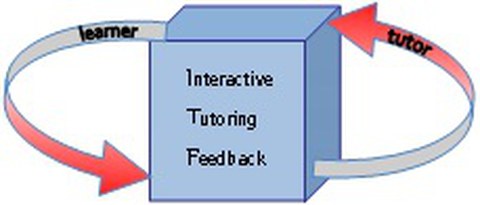Informative tutorial feedback (ITF)
ITF offers information for the correction of mistakes or for the overcoming of obstacles in the learning process, without directly providing the solution. In different studies it has proven to be more learning and motivational enhancing than feedback, that simply offers the correct answer (e.g. Narciss, 2004; Narciss & Huth, 2006). Among others, ITF-strategies have been developed and examined in the SERENA project.
Central concern of our research of informative tutorial feedback is to develop ITF components for different learning tasks and evaluate them with respect to their cognitive, motivational and metacognitive effekt, based on the interative two-feedback-loops model (ITFL-Modell; Narciss, 2006, 2008).
Selected publications
-
Laudel, H., & Narciss, S. (2023). The effects of internal feedback and self-compassion on the perception of negative feedback and post-feedback learning behavior.
Studies in Educational Evaluation, 77, 2023, 101237,
-
Narciss, S., & Zumbach, J. (2023). Formative Assessment and Feedback Strategies. In: Zumbach, J., Bernstein, D.A., Narciss, S., Marsico, G. (eds) International Handbook of Psychology Learning and Teaching. Springer International Handbooks of Education. Springer, Cham. https://doi.org/10.1007/978-3-030-28745-0_63
-
Narciss, S., Prescher, C., Khalifah, L., & Körndle, H. (2022). Providing external feedback and prompting the generation of internal feedback fosters achievement, strategies and motivation in concept learning. Learning and Instruction, 82, 101658, https://doi.org/10.1016/j.learninstruc.2022.101658
-
Narciss, S., Hammer, E., Damnik, G., Kisielski, K., & Körndle, H. (2021). Promoting Prospective Teacher Competencies for Designing, Implementing, Evaluating, and Adapting Interactive Formative Feedback Strategies. Psychology Learning & Teaching, 20(2), 261–278. https://doi.org/10.1177/1475725720971887
- Narciss, S. (2013). Designing and Evaluating Tutoring Feedback Strategies for digital learning environments on the basis of the Interactive Tutoring Feedback Model. Digital Education Review, 23, 7-26. [Accessed: 19/06/2013] http://greav.ub.edu/der
- Eichelmann, A., Narciss, S., Schnaubert, L., & Melis, E. (2012). Typische Fehler und Fehlerquellen bei der Addition und Subtraktion von Brüchen – Ein Review zu empirischen Fehleranalysen. Journal für Mathematik-Didaktik, 33, 29–57. DOI 10.1007/s13138-011-0031-5
- Narciss, S. (2012). Feedback in instructional contexts. In N. Seel (Ed.), Encyclopedia of the Learning Sciences, Volume F(6), pp. 1285-1289. New York: Springer Science & Business Media, LLC.
- Narciss, S. (2012). Feedback strategies. In N. Seel (Ed.), Encyclopedia of the Learning Sciences, Volume F (6), pp. 1289-1293. New York: Springer Science & Business Media, LLC.
- Narciss, S. (2008). Feedback strategies for interactive learning tasks. In J.M. Spector, M.D. Merrill, J.J.G. van Merrienboer, & M.P. Driscoll (Eds.), Handbook of Research on Educational Communications and Technology (3rd ed., pp. 125-144). Mahaw, NJ: Lawrence Erlbaum Associates. [ausgezeichnet mit Distinguished Development Award 2007 of the Association on Educational Communications and Technology - AECT]
- Narciss, S. (2006). Informatives tutorielles Feedback. Entwicklungs- und Evaluationsprinzipien auf der Basis instruktionspsychologischer Erkenntnisse. Reihe Pädagogische Psychologie und Entwicklungspsychologie, Band 56. Münster: Waxmann.
- Narciss, S. & Huth, K. (2006). Fostering achievement and motivation with bug-related tutoring feedback in a computer-based training on written subtraction. Learning and Instruction, 16, 310-322.
- Narciss, S. (2004). The impact of informative tutoring feedback and self-efficacy on motivation and achievement in concept learning. Experimental Psychology, 51(3), 214-228.
- Narciss, S. & Huth, K. (2004). How to design informative tutoring feedback for multimedia learning. In H. M. Niegemann, D. Leutner & R. Brünken (Hrsg.), Instructional design for multimedia learning (181—195). Münster, New York: Waxmann.

